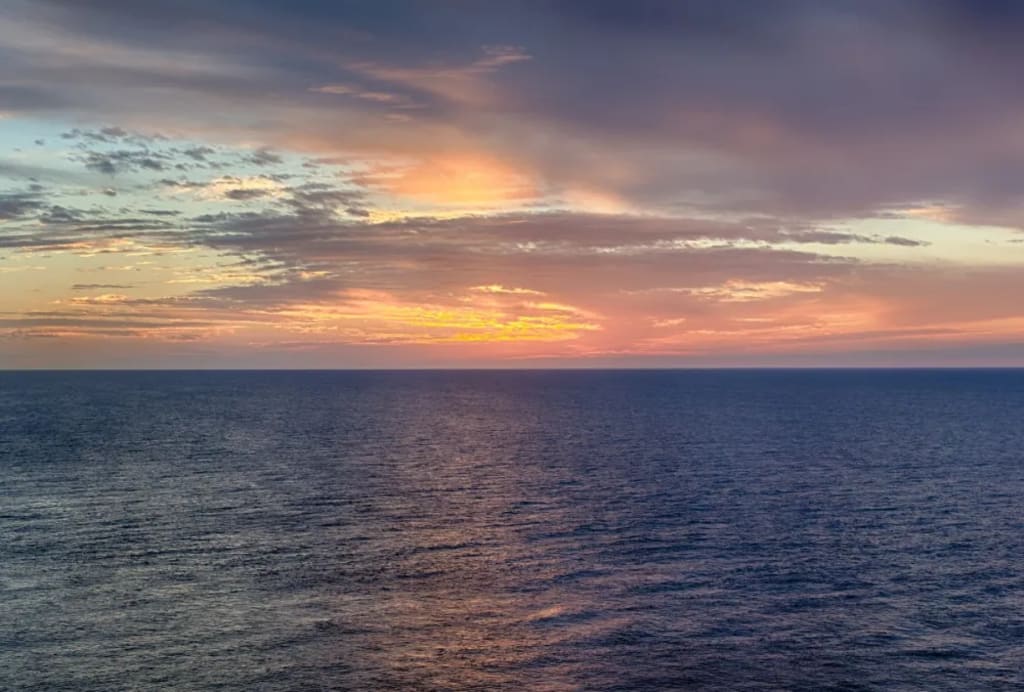Neptune’s Lantern
Motorcycle, Lantern, Mermaid

People in my family have this weird habit of disappearing, never to be seen again. My oldest aunt vanished long before I was born, then my uncle, when I was four, my other aunt when I was nine, and, when I was fifteen, my father. Family legend says that just after my dad and his siblings had been born, the vanishing streak had begun, with my grandmother, though nobody could say for sure except my grandfather, and she was one of the few topics he would not speak about.
My grandfather was not what most people would call a strange guy. Considering all that had happened to him in his life—from spending much of his childhood in a literal dump to his drug addiction as a young teen to being a POW in the Second World War for nearly a year—he was surprisingly well adjusted. He never exhibited signs of “shell shock,” which is what they used to call post-traumatic stress, nor did he become obsessively pro or anti military. He never relapsed into drug use, was always laughing, always treating people with kindness and respect. That didn’t stop the rumors, though.
While he was generally a well liked man, there were always gossips and haters of my grandfather, accusing him of negligence at best, serial murder at the worst. Still, he took it all in stride, and no official investigation was ever made with him as a suspect, which, looking back, is a bit weird. It was hard to suspect him, good natured as he was, of any kind of foul play, especially concerning his own children. He remained tight-lipped about it all, refusing to speak of it with anyone. That is, until January 17th, 1988: my nineteenth birthday.
My grandfather called me and asked me to visit him at the family cottage, which was on a cliff overlooking the ocean about twenty miles up the coast from Santa Barbara. It was only an hour drive from where I lived, and I missed him. So I hopped on my motorcycle and went. The journey was easy; nothing of note occurred.
I found him down at the beach as I knew I would, staring out over the fiery glow of the sunset and its reflection, looking as though he’d been standing there, waiting, for years. I called to him, and when he turned to face me, he looked older and sadder than I’d ever seen him. He immediately resumed some of his usual demeanor, but it seemed strained. He asked me to walk with him. I did. What he proceeded to tell me was so strange I was never sure I believed it: not then, not after his death, not until today, thirty-five years later.
The first thing he said was that he had never been a prisoner of war. That in itself was so mind-blowing I just gave in and let him continue without a word.
Young Tommy Shepphard had not been particularly idealistic except in his views on art and education. But when it came time to serve his country in the effort to save the world, by golly, he had to go, didn’t he? In April of 1943, the naval ship on which Tommy served was attacked in the night, presumably by the Japanese, and destroyed. A week later, all but eleven soldiers were accounted for. The commanding officer, unwilling to admit any man might have died on his watch, pronounced them all prisoners of the Japanese military. Meanwhile, Tommy was deep underwater, and alive.
Tommy and two other soldiers had been rescued, not from above, but from below. They had been given special stones with handles that glowed brightly enough for them to see along the ocean floor. It also seemed to allow them to breathe and walk along the ocean floor as though the water wasn’t even there. The city they stayed in had a rustic quality to it, but with technologies Tommy and his friends had never dreamed of. The people were intelligent and kind; they produced art and music unlike anything the surface boys could have imagined. One of these people, a woman named Z’lsha (yeah, I can’t pronounce it either), was my grandmother. Again, I never fully believed it until today…but I’m one quarter mermaid.
Tommy, my father’s father, lived among these sea people for nearly a year, his “Neptune’s Lantern” always by his side. During that time, both of the surface friends who had come with him became ill of an unknown ailment and died, one after six months, the other after ten. When Tommy and the newborn quadruplets began showing symptoms, Z’lsha insisted that he return to the surface immediately, though she could not follow, and though it would break her heart to say goodbye. If it hadn’t been for the babies, he said, Tommy would have stayed with her, right to the end. As it was, without his permission, his heart was now divided. He was deeply in love, but he could not risk the safety of the children. So he went.
A team of seapeople brought Tommy and the children to the surface. Z’lsha carried Tommy’s lantern so that they would not drown on the way up. She said goodbye to the husband and children she knew so shortly and yet so well, her heart breaking, and they were gone. Tommy and his children surfaced, and they were able to make it back to his hometown, with the help of the US Navy. The details of how that occurred were not explained to me. What was explained to me is how heartbroken my grandfather had been the day his daughter vanished.
Bella had been fourteen when she started feeling the illness. Tommy’s first thought was that she’d been out with boys and that this was morning sickness. But he trusted her when she said it couldn’t be. Then, of course, he started to get worried. What could it be? Her doctor didn’t know. Nobody knew. Bella’s skin started to get softer, almost goopy. She had trouble breathing air. And then he knew. Tommy took his daughter out to the ocean, and let her go. He told me it was harder even than leaving Z’lsha all those years before. He watched as his baby girl faded into the water, leaving one life behind to continue with another. Over the years, Tommy did the same for his other children, one by one, until he was, in a way, all alone.
He wasn’t sure if there was enough seaperson in me for me to be affected the same way, and after all, I had not been born deep within the ocean, but he thought I should know; he thought somebody should know, before he went. He gave me his lantern—an emerald green, beautiful fixture—and wished me the best. He died two weeks later.
My cousins started disappearing a few years ago. I didn’t want to believe that what my grandfather had told me was true, and my powers of denial were strong. I’m the last of the ocean bloodline left, aside from my own daughter. Yesterday I began feeling a dull, aching queasiness unlike anything I had felt before. I’m having trouble breathing. I don’t know if it’s my imagination, but the lantern seems to be emanating a dim glow from deeper within than is physically possible; as though a world exists within it. I’m heading to the beach now. I hope that the blood of my grandmother is not so diluted that I will not see my daughter again. But perhaps, now, I’ll finally meet my grandmother.
About the Creator
Scott C Lillard
Father, Husband, Physicist, Award-Winning Composer and Musician






Comments
There are no comments for this story
Be the first to respond and start the conversation.